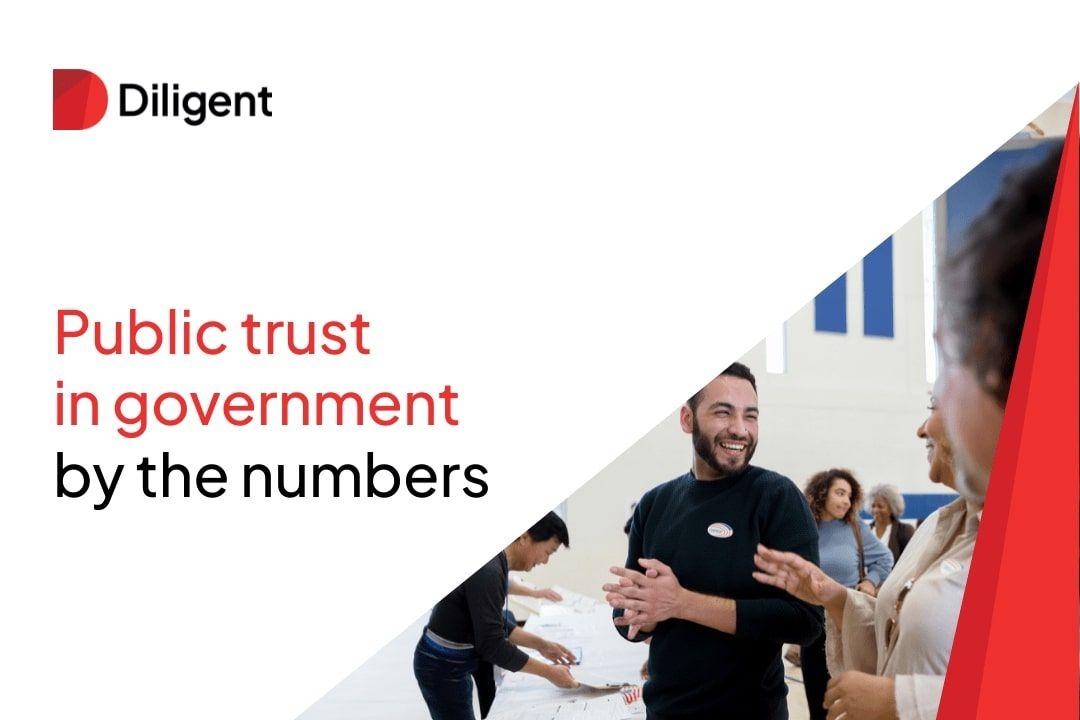Public trust in government: by the numbers

For individuals working in local, state or federal government, information about public trust can provide valuable insights and implications. Understanding the level of public trust and what citizens want from their government organizations can help leaders identify areas where trust may be lacking and guide proactive measures to address those concerns.
Public trust in government is a critical element for the successful functioning of any level of government, whether it be local, state or federal. Trust is the foundation upon which government organizations build legitimacy and credibility, and it is crucial for fostering effective governance.
Integrity is inherently connected with trust. When citizens feel that their government officials are working hard to earn their trust, it builds confidence in the public's view of the government.
We have put together some statistics and figures about public trust and government in our latest infographic.

Download the infographic in pdf format here.
A definition of public trust in government
Deloitte has developed a TrustID framework that is designed to get to the heart of trust. At its core, trust can be assessed by two elements:
- Perceived competence
- Positive intent
A government’s operational capability and reliability demonstrate its competence, while its humanity and transparency demonstrate positive intent.
The state of public trust in government
Public trust in government remains low, as it has for much of the 21st century. According to Pew Research, "only two in ten Americans say they trust the government in Washington to do what is right 'just about always' (2%) or 'most of the time' (19%). Trust in the government has declined somewhat since last year, when 24% said they could trust the government at least most of the time."
Edelman’s Trust Barometer for 2023 shows that 61% of citizens do not think their government organizations offer a reliable source of trustworthy information, and their survey showed that 42% of Americans distrust government.
Consequences of public distrust
Unfortunately, there are a number of consequences that come with a lack of public trust in government organizations. These can include:
- Reduced voter turnout
- Lower participation in public consultations
- Decreased citizen engagement
- Diminished involvement in civic activities
- Citizens may question authority and decisions made
- Decreased compliance with laws and regulations
- Lack of support and skepticism can hinder successful execution of government programs
- Lower government employee satisfaction
- Corruption and misuse of power with limited accountability and oversight
- Inefficient, unresponsive or unaccountable institutions
- Investors and businesses may be hesitant, resulting in reduced economic growth and fewer investment opportunities.
- Erosion of social cohesion in communities
Lack of trust can also lead to what’s been termed a “mistrust loop” — when diminished trust in government leads people to feel less empowered and disengaged, resulting in inefficient or unresponsive institutions.
Clearly, building trust and being transparent is crucial for state, local and federal government organizations.
Top 5 things the public wants from government
Transparency, perhaps not surprisingly, appears on a list of top things that citizens want from their government, according to a national survey conducted by the Partnership for Public Service and Freedman Consulting:
- More accountability (50%)
- Solutions to the big problems facing the country (44%)
- More efficiency with public resources (41%)
- More transparency (38%)
- More responsiveness to the public (31%)
Using governance technology can help
Using governance technology to enhance public trust and transparency can yield benefits for local, state, and federal governments.
Enhanced accountability
Greater transparency in government operations by providing accessible and real-time information on decision-making processes.
Improved public engagement
Enable citizens to provide feedback, participate in consultations, and stay informed about government initiatives, fostering a sense of inclusiveness and empowerment.
Live streaming increases visibility
By being able to watch meetings, the community can better understand government organizations’ intention and purpose.
Data-driven decision making
Technology tools enable the collection, analysis, and visualization of data, which facilitates evidence-based decision-making and informed policy choices, leading to more effective and efficient outcomes.
Increased transparency in public spending
Detailed information on government budgets, expenditures, and contracts can be shared to help foster trust in the financial management of public resources.
Improved anti-corruption measures
Digital auditing tools can help identify and mitigate corrupt practices, bolstering public trust in government integrity.
Enhanced data privacy and security
Robust cybersecurity measures, data protection protocols and compliance frameworks can enhance citizens' confidence in the government.
Strengthened trust and social cohesion
Trust and social cohesion can be increased through improved transparency and citizen engagement.
Transparent and inclusive governance processes
Good governance processes help promote a sense of shared ownership, encouraging collaboration and cooperation among government, citizens and civil society organizations.
Digital experience drives trust
A citizen’s digital experience with a government agency is a strong predictor of their overall level of trust.
Mission matters
The mission of various government agencies can greatly influence citizens’ perception of trust. Communicating your mission and purpose through your public website and meeting documents will help here.
As the Organisation for Economic Co-operation and Development (OECD) said in its “Trust in Government 2021” report, "Public trust in government is essential for a thriving democracy. It fosters citizen engagement, promotes cooperation, and ensures the legitimacy of government actions, ultimately leading to the well-being of society as a whole."
See how Diligent Community can transform your local government or school board and help you build trust and transparency. Request a demo today.